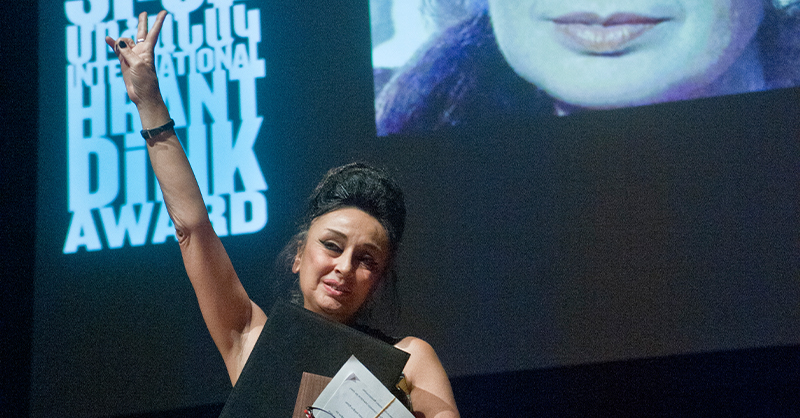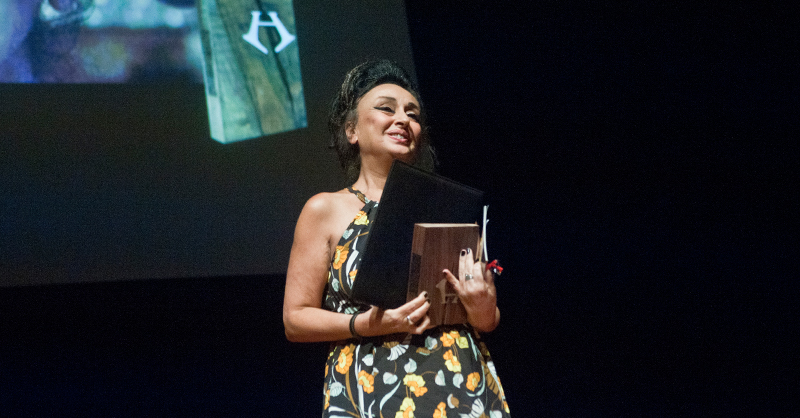
Eren Keskin was born on April 24th, 1959 to a Kurdish father and a Circassian mother in the city of Bursa. Under the influence of her family, she grew up with a sympathy for leftist politics. Studying at the Faculty of Law of Istanbul University, she fulfilled her childhood dream of becoming a lawyer, and began taking on political cases. She became the director of the Human Rights Association, of which she was already a member since 1989.
During the state of emergency of the early 1990s, when the village guard system, scorched-earth practices in villages, extrajudicial killings and forced disappearances had become state policy in Kurdish-majority areas, she took part in committees formed to fight against the grievous human rights violations in the region; during visits to the region she was the target of verbal as well as armed attacks.
In the 1990s, nearly 200 cases were brought against her, and in 1995, she was convicted in one of these: Because she had used the word “Kurdistan” in an article published in the newspaper Özgür Gündem titled “The World Owes a Debt to the Kurdish People,” she spent six months in jail.
Another area in which she has struggled is that of sexual abuse of women. In her ward during her 1995 imprisonment, she learned that nearly all of the women –many of whom were her former clients– had suffered sexual abuse during their time in prison, and after her release from prison in 1997, in order to address this issue, she formed the Legal Assistance Office against Sexual Abuse and Rape in Custody. Within twenty years, hundreds of women sought the assistance of the office, which continues to operate today.
In 2002, in a case brought against her for a speech she gave in Germany on the subject of sexual torture by state, she was sentenced to ten months in prison on the grounds that she had “insulted the moral personality of the Turkish Armed Forces.” Her sentence was converted into a fine, which was paid with donations gathered in a campaign undertaken by the Human Rights Association. That same year, the Disciplinary Board of the Union of Turkish Bar Associations issued a decision to bar her from working as a lawyer for one year. During this period, the mainstream media engaged in a smear campaign against her.
As part of a support campaign for the severely oppressed Özgür Gündem newspaper, she served for three years as its co-editor in chief. Today there are still 143 open cases against her, one for a speech she made, and the others concerned with this duty which she performed voluntarily.
Bravely and uncompromisingly, she continues to defend human rights in Turkey, standing by the victims via the institutions and initiatives and efforts that she manages and takes part in. While being subject to death threats, physical attacks and hate speech because of her criticism of the government, she undertakes all the risks and brings human rights violations onto the agenda, for the people of Turkey and the world.

THANK YOU HRANT DINK!
Rakel Dink’s voice on the phone and her words, ‘‘this year’s award is given to you, I wanted to be the one telling this to you’’… It was such a moment of my life that I will never ever forget…
I got so excited, I cried…Perhaps, this award is the most beautiful gift I have ever received in my life…
Hrant Dink, for me, is the symbol of naiveness and courage!
Courage does not always entail radical moves and words.
One can also speak the truth, which people will never ever accept and want to hear, in a courageous and naive language.
This is what Hrant Dink did, he devoted his life to this.
The great crime of the century, Armenian Genocide!
And a system, a state that was built upon this great crime!
A society that is guilty of genocide with its rightists, leftists, liberals; a society that has been shaped with the İttihad (unionist) ideology!
It was genuinely very difficult to speak!
It was in fact very difficult to speak to those who have become accomplices to this crime by choosing to deny, to remain silent, to forget, to disregard what happened!
Hrant Dink chose this difficult path. And he lost his life for the sake of this path…
Millions who bid their last farewell to Him on the day of his funeral, a gathering that this geography will possibly never witness again, were there to show respect for this NAIVE COURAGE.
As a person who learned about her own ‘banned identity’ at the age of 13, I was still a child when I got to know yet another ‘banned identity’.
My uncle had been married to an Armenian woman. My grandfather, a man of law who claimed to be a democrat, had made it a condition that my uncle’s wife converted to Islam.
I was never able to make sense out of this injustice in those years, with my child mind…
Years later, as I grew older, I got to know the unbearable weight of the things that had been done to the Armenian Nation.
I am one of those who believes that the first and foremost requisite for our geography to get democratized is to face the 1915 Genocide.
Recognition and reparation, will not only serve for dealing with the past properly, but will also help all peoples of this geography to love one another freely.
In such a society of fear, speaking the truth that the state does not want to face is not easy at all… Especially at a time when journalists and human rights defenders are in jail, especially during these days that I may end up in jail any time due to the 143 pending cases against me. It is not easy at all, and it is distressing.
As Hrant Dink expressed beautifully, ‘we all have the disquitness, the restlessness of doves…’
Yet, this feeling should not hinder us from courageously speaking what we believe in…
Just as Hrant Dink did!
Thank you Hrant Dink, for leaving us the legacy of love, kindness and courage…
